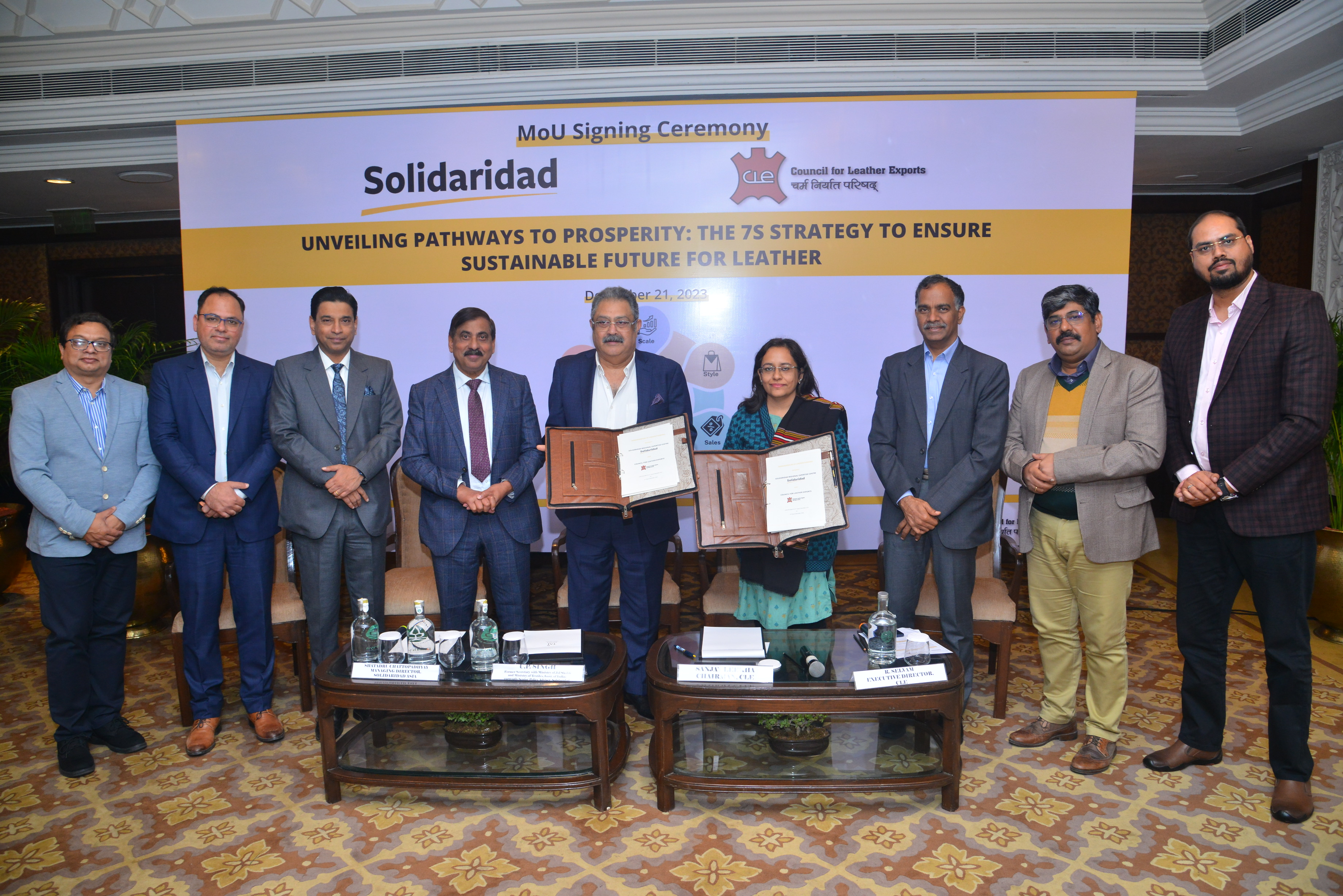by Suman Gupta
Mumbai / New Delhi, December 26, 2023: Solidaridad Regional Expertise Centre (SREC) and the Council for Leather Exports (CLE) have forged a strategic partnership to further strengthen the performance of the Indian leather industry in domestic and international markets. The Memorandum of Understanding (MoU), which was signed in Delhi today, marks an important milestone for the Indian leather industry. The MoU, effective from 1 January 2024 till 31 December 2028, initiates a pivotal five-year partnership between SREC, a prominent not-for-profit organization established in the year 2008, and CLE, operating under the Ministry of Commerce and Industry, Government of India. At the core of this partnership is an unwavering dedication to empower and upskill the tannery workforce. Through joint efforts, Solidaridad and CLE aim to introduce comprehensive training programmes, facilitate access to cleaner technology, and promote certifications that enrich the skill set and knowledge base of those involved in the leather industry.
The MoU outlines the collaboration’s commitment to train 150,000 workers over five years, conduct capacity-building programmes, and build partnerships with leading leather institutions and leather businesses in the country. CLE will support trainings, workshops, engagement with stakeholders, and contribute towards the development and promotion of a Leather Portal for green and circular leather practices.
SREC brings a wealth of experience and a strong footprint in the Indian leather industry. It has been at the forefront of supply chain transformation through sustainable practices across various leather geographies like Kanpur, Kolkata, and Tamil Nadu. CLE is committed towards the overall development of the Indian leather sector and achieve higher export growth to enhance India’s share in the global leather trade.
On the occasion, Mr. Sanjay Leekha, Chairman, CLE said: “The Council for Leather Exports has set an ambitious target of US$ 47-billion business by 2030 for the Indian leather industry. This opens up avenues for leather professionals to innovate. I am happy to share that the MoU between CLE and Solidaridad is an alliance to represent a commitment to steering the Indian leather and footwear industry towards a more sustainable future. We are embarking on the journey of partnership, innovation and commitment to sustainability that will bring about transformative changes in the industry. Being responsible organizations, our endeavour would be to shape a sustainable future for this ever-evolving, labour-intensive manufacturing and exporting sector of India. Such an initiative also aligns very well with the ‘Make in India’ motto of the Government of India.”

Ms. Monika Khanna, Country Manager, SREC called the partnership a powerful union of expertise and commitment, where SREC’s on-ground experience in sustainable practices joins forces with CLE’s dedication to sector development and global outreach. “Together, we’re not just aiming for efficiency and growth, but for a complete transformation – a transformation that prioritizes responsible production, empowers our workforce, and propels India’s leather sector to a leadership position in global markets. Over the next five years, we will train 150,000 workers, build capacities, and foster partnerships that drive innovation and sustainability. This is more than just a collaboration; it’s a catalyst for a greener, more equitable, and thriving future for Indian leather.”
Mr. R. Selvam (IAS), Executive Director, CLE highlighted the significance of this collaboration and said, “This collaboration will provide impetus to our joint vision of unlocking pathways to prosperity in the leather sector through the 7S strategy – sustainability, scale, skill, speed, supply chain, sales, and style.”
Mr. Tatheer Zaidi, Asia Head of Pollution Management in MSMEs at Solidaridad expressed enthusiasm about this transformative collaboration and said, “The signing of the MoU signifies a dedicated commitment towards the holistic development and advancement of the leather sector, particularly focusing on empowering the tannery workforce through training and capacity-building initiatives.”
This strategic partnership comes on the back of SREC’s work in promoting sustainable practices in the Indian leather sector. The organization embarked on this journey in 2017 as an implementing partner for the ‘Pollution Prevention and Efficient Water Use in Kanpur-Unnao Leather Cluster’ project, funded by the Government of the Netherlands. SREC’s groundbreaking efforts led to the introduction of cutting-edge technologies like water flow meters, solenoid valves, and Smart Water Saving System, effectively reducing water usage in tanneries. The innovative waste-to-value practices, producing paver tiles from lime sludge, extracting tallow oil from fleshing, and creating bonded leather from buffing dust, have earned Solidaridad appreciation from the industry.
The MoU builds on the collaboration between Solidaridad and CLE, which has already yielded remarkable progress in sustainability practices, notably in areas such as water optimization, effluent reduction, circularity, greenhouse gas (GHG) emission reduction, and the integration of digital tools. Notable achievements include the inauguration of the Leather Trade Intelligence Portal in Kolkata and the recent launch of the LTIP QR Code during the LAFCAN event in Delhi by the Chairman of the Council for Leather Exports. These initiatives reflect the unwavering commitment of both the organizations to drive sustainable change in the Indian Leather Industry.
About Solidaridad: Solidaridad has been a frontrunner in sustainable economic development and champions the cause of the small and marginal farmers, workers, and miners. The organization fosters sustainable and inclusive supply chains, focusing on bringing prosperity; harnessing inclusivity, and producing in balance with nature.
With over 50 years of experience in developing solutions to make communities more resilient, Solidaridad employs around 1,000 expert staff as boots and brains on the ground, operating in over 40 countries across five continents through eight independently supervised regional offices.
Recognizing markets as pivotal to realizing positive changes in the society and environment, Solidaridad looks at public-private partnerships as an increasingly important mechanism for testing innovations, speeding up change, and taking success to scale. With improved scale and speed, the organization aims to create a pervasive impact in society toward a more inclusive, climate-resilient, and sustainable economy.a

